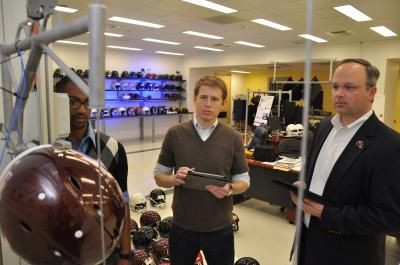Virginia Tech Releases 2013 Football Helmet Ratings, Adds 1 More To 5-Star Ranks

After an outpour of criticism regarding the NFL's supervision of traumatic brain injuries, the league has been adamant about improving safety precautions to ensure every player's future health is protected.
In a further attempt to develop adequate concussion safety standards in not only professional football but also football at all levels, Virginia Tech released the results of its 2013 adult football helmet ratings. Four different helmet models received a five-star rating, the highest rating a helmet can receive.
"It is encouraging to see the progress in helmet design over the past two years. We were able to utilize funding from the National Institutes of Health (NIH) to collect data that provided the foundation for this translational research. In addition to the high performing Riddell and Rawlings helmets of last year, you saw Xenith, SG, and Schutt all introduce new helmets this year that are performing very well," said project director Stefan Duma, the Harry C. Wyatt Professor and department head of the Virginia Tech - Wake Forest School of Biomedical Engineering and Sciences (SBES).
Helmet models given a five-star rating included the Riddell 360, Rawlings Quantum Plus, Riddell Revolution Speed, and the most recent addition called the Xenith X2.The SG Adult Helmet, Schutt Vengeance, Schutt ION 4D, Rawlings Impulse, Xenith X1, Riddell Revolution, Rawlings Quantum, and Riddell Revolution IQ were all given a rating of four stars, which is considered very good.
"Overall, we recommend players select one of the 4 or 5 star helmets. The specific helmet a player chooses will be dependent on additional factors such as a fit and comfort," said Duma.
To gauge each helmet's effectiveness in safeguarding against concussions, 120 impact tests were conducted on different areas of the helmet to varying degrees of intensity. Laboratory tests were compared with on-field concussion risks through the Summation of Tests for the Analysis of Risk, or the STAR equation.
The Virginia Tech Helmet Ratings system has currently assessed 18 helmet models encompassing 2,000 laboratory tests since its launch in 2011. The comprehensive list of all 18 helmet ratings is available at the SBES website.
Steven Rowson who developed the STAR Evaluation System said, "It's great to see manufacturers tweaking their current helmet models to reduce head acceleration. When you consider the millions of athletes participating in organized football, selecting helmets that reduce head acceleration can have a large impact across the sport."
In January of this year, the family of former NFL linebacker Junior Seau filed a wrongful death lawsuit against the league following the player's suicide back in May of 2012. The Seau family is certain the pro-bowler would have never made that decision had he not sustained some many traumatic brain injuries.
"It is important to note that no helmet can prevent all concussions. The most effective strategies to reduce concussions in sports involve modifying league rules and player technique to limit exposure to head impacts," Duma added.
"Beyond this, head impacts are a given in sport. Our research focuses on identifying helmets that reduce concussion risk so that athletes can make informed decisions based independent data when purchasing equipment, which in turn, incentivizes helmet manufacturers to design helmets that better reduce head acceleration."
Published by Medicaldaily.com



























